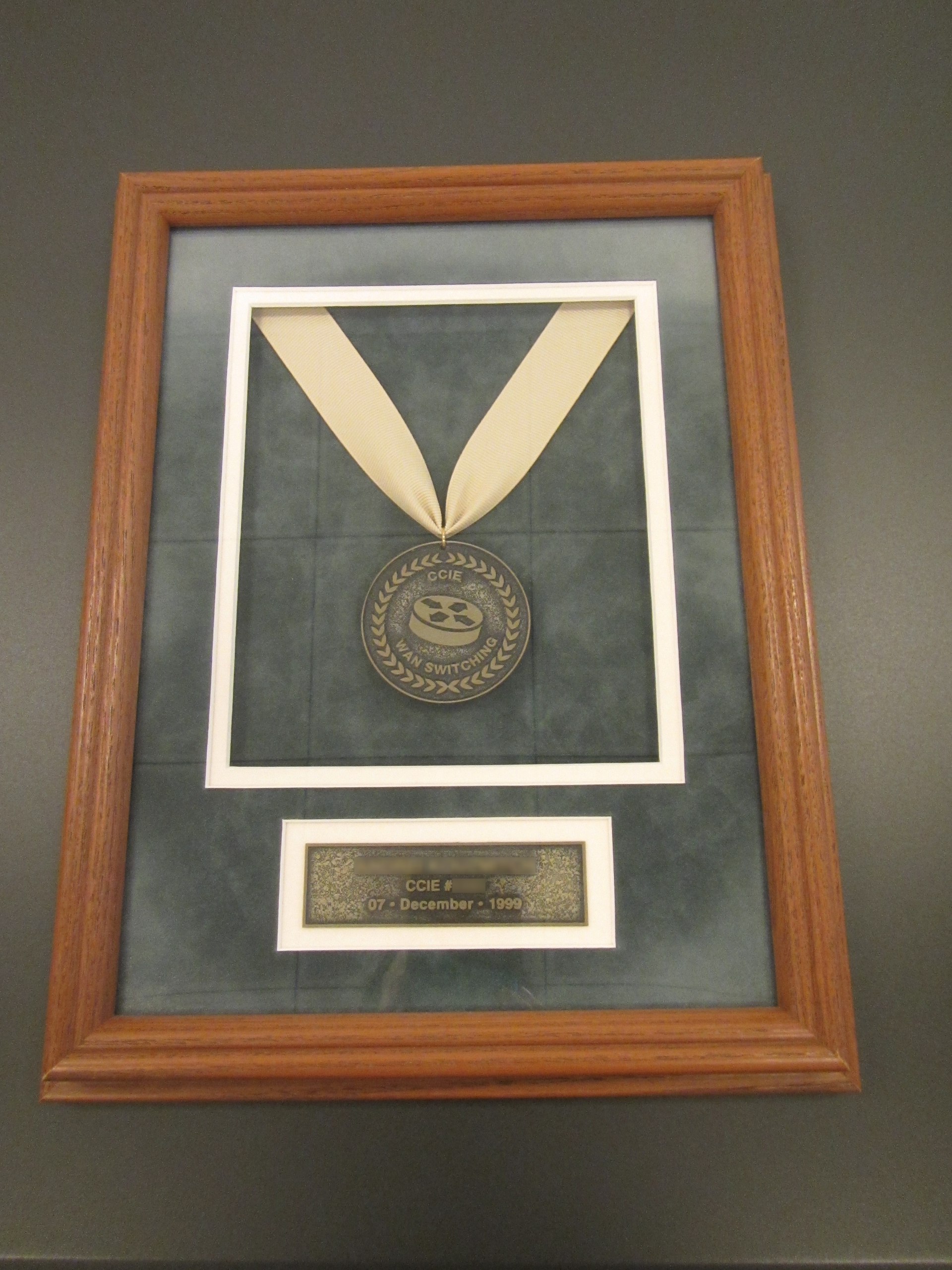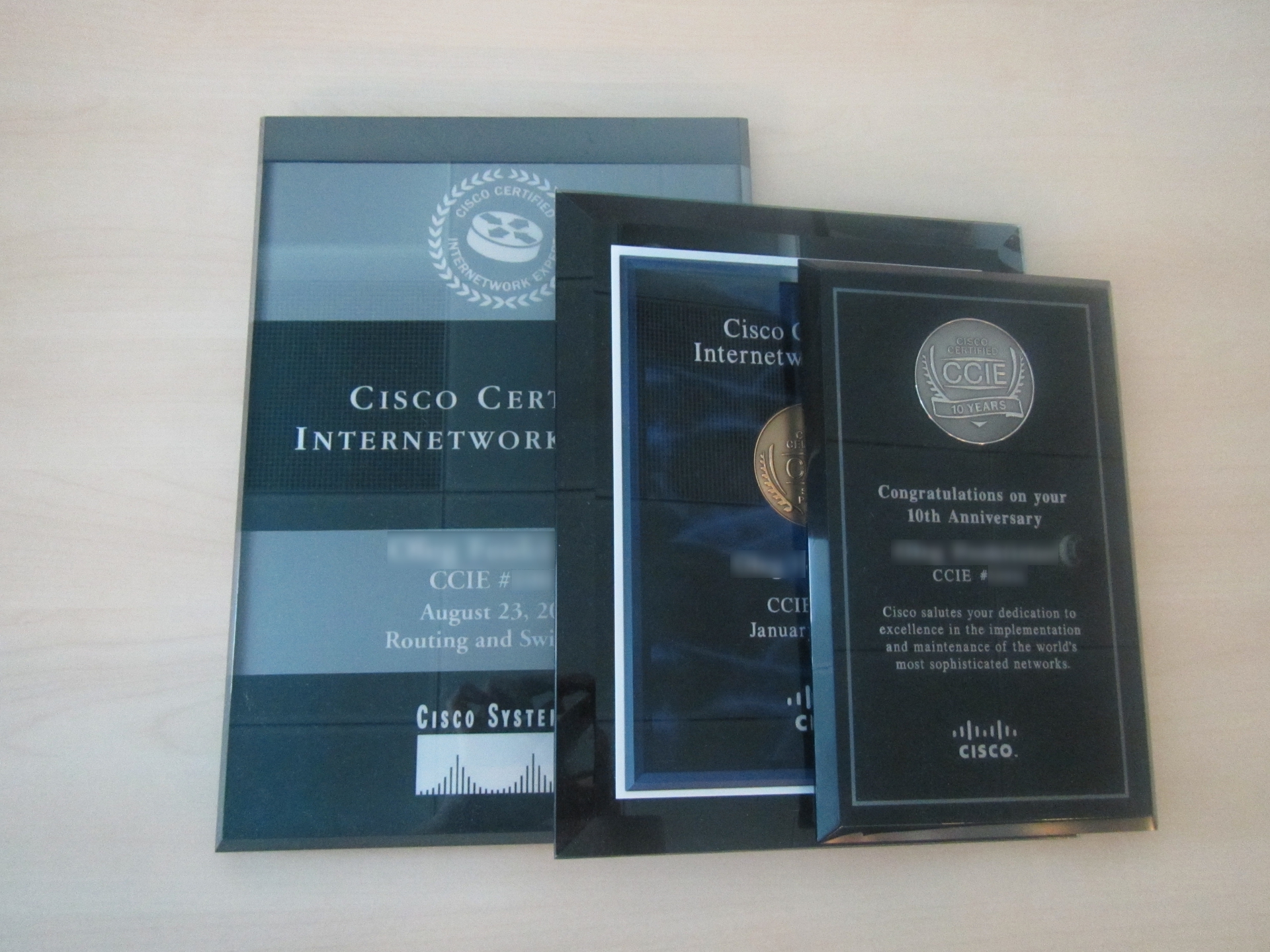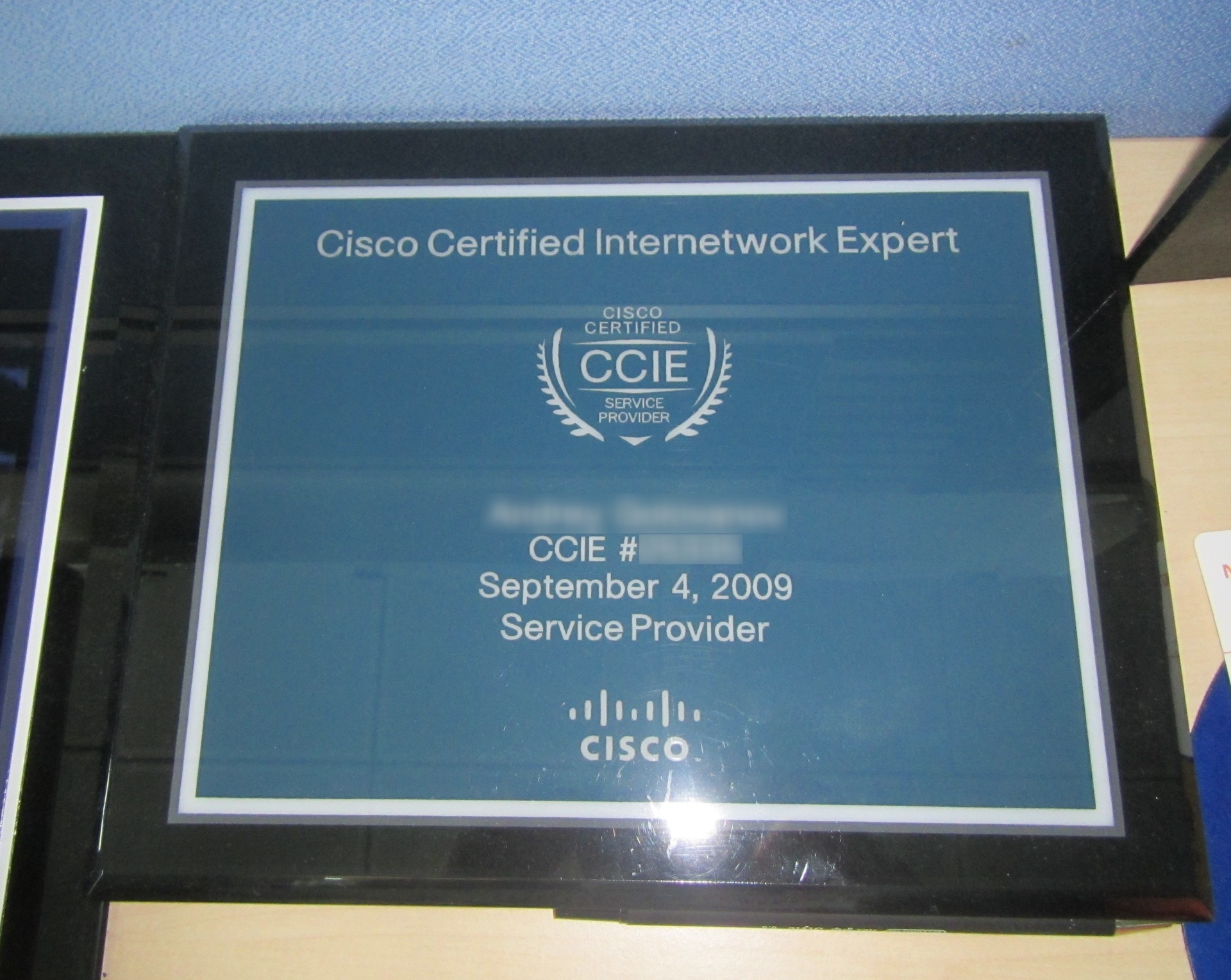The reverse side of the coin or what the CCIE lab exam looks like on the other side
I work for Cisco and, among other things, am responsible for conducting Cisco CCIE Mobile Laboratory Exams in Moscow. Today I will tell you about how the delivery of the lab looks from the inside. In the beginning, a little information about the exam, rare certificates that I managed to find with our company employees, and then we will move on to exciting stories from my practice.

Initially, the exam consisted of 2 days of laboratory work. Since 1993, certification has changed many times, following new directions in the IT industry, adding new technologies and vice versa, excluding those technologies that became irrelevant.
Currently, the following CCIE certifications are available:
• CCIE Routing & Switching - the most popular and common certification.
• CCIE Security
• CCIE Collaboration (formerly CCIE Voice)
• CCIE Data Center
• CCIE Service Provider
• CCIE Service Provider Operations
• CCIE Wireless
After passing the exam, you are assigned the status of expert network technologyguru .
But earlier certificates looked completely different and there were much fewer certified specialists. Certificates and honorary boards are undoubtedly the pride of every technical specialist in the field of network technologies! Many employees decorate their desks or cabinets with them. Engineers in our office are no exception. I photographed copies of awards that were presented earlier and now.
So, rarity number 1 is a medal (we hid the names in the photographs, our employees areembarrassed by their unusual modesty):

There were also later copies and honorary boards for 10 years of maintaining certification, some employees have entire collections:

Or such:

Awards change over time, but CCIE expert status has always remained unchanged and is highly regarded by employers around the world. To maintain the CCIE certificate, you must retake the written exam every 2 years. Moreover, it does not have to be using the same technology. After 10 years of maintaining the status, an honorary board is sent to you :) There is the
possibility of passing laboratory work in Moscow.
As you probably know, CCIE certification consists of a written exam and lab work. Until 2008, it was possible to pass the laboratory exam only in stationary laboratories, which are not many in the world. The closest to us is in Brussels. But then a mobile laboratory scheme was invented, when candidates who want to pass a laboratory exam can try to pass the exam at their local Cisco office. The equipment is remotely connected to the office with the laboratory, in our case also to Brussels.
The first time a mobile laboratory came to us already in September 2008. Wow, how much time has passed! At first we started only one track - Routing & Switching. Now a track on Security is already available and even somehow managed to hold CCIE Voice =)) How I persuaded the central team and looked for phones for the lab - is another story.
Since we do not have a local lab, we also do not have a local proctor. We were always "discharged" of proctors from abroad.
A proctor is a lab exam examiner, such a network professor. He sets up the equipment before the exam, monitors candidates for obtaining expert status during the exam, answers questions and fixes technical problems if they suddenly arise. Proctors usually also have CCIE certificates, and some even a few.
Our first proctor came from Australia. Later, he came to us several times, our engineer, who was preparing for the lab, called him "Cartoon", for his similarity with cartoon characters and constant jokes, and he really liked Russia. At first, it was difficult to talk with him, because he kept chewing on the last syllables and tried to insert his Australian slang. Also in Russia, he first saw snow and felt real cold! Now he also works at Cisco, but he is no longer a proctor.))
Then proctors came to us from other countries, or rather a lab - from a lab in Brussels, Tokyo, Dubai and so on. In general, everyone was happy, we always prepared well and helped with equipment and logistics. They were all different. Proctor from Tokyo was a Chinese man who was born in Taiwan. He was terribly afraid of everything and somehow was lost, he was looking for a taxi for an hour, it was that epic. Proctor from Brussels was a young guy, he constantly smoked and was glad that we had cheap cigarettes. He came with his bride. The bride was half Brazilian, half Belgian, absolutely charming! Now they are already married. And he is engaged in the development of a lab and also no longer works as a proctor.
Also, very interesting characters came to us. Usually candidates come to Moscow from Russia and the CIS (Ukraine, Belarus, etc.). Several times foreigners came to us. One Egyptian citizen was several hours late, didn’t even try to turn in the lab, and then demanded that we settle him in the center of Moscow for $ 50. Somehow a foreign citizen could not write on the keyboard with Russian letters. He said that the Russian letters terriblyfrighten him . Some candidates are very nervous. These usually don’t. Therefore, we must better prepare and less nervous. And don't be late, yes. Because no one will compensate you for the missed time. Everything is strict and on the clock.
There are a lot of questions that you can take with you. You can’t take anything with you. Maximum - glasses and a sweater (jacket). You cannot bring any electronic devices or stationery with you. Everything is strictly prohibited. Of course, we do not check with dogs and do not force us to go through a metal detector, but if suddenly the proctor sees that you brought something with you, then your exam will be immediately canceled. Is it worth the risk?
In Russia, fortunately, we did not have such precedents. I know what often happens in China. It is generally difficult with China, they manage to memorize options for laboratory work, and then they are cloned and the options walk on the network. And this is also one of the reasons why exam versions are constantly changing.
Of course, the first time few are handed over, but in Russia one of the best percentages for passing CCIE.
I was told that there was one person who handed in 17 times. And in the end he did. But the maximum number of attempts that I saw is more than 30! But this, of course, is rare. Usually surrender from the second or third time. Employees, too, often rent out in Moscow, too, by no means all the first time, so no good!
First, the exam checks the script, then the proctor surely looks, re-checks manually. And be sure another proctor in a different time zone. Therefore, by the morning your exam can be checked! If the candidate thinks that he still scored a much better score and passed the lab, then you can appeal. Perhaps this makes sense if you are very confident in yourself, and your score is very close to the passing. But appeals are far from always satisfactory. Very privately, the candidate inattentively reads the assignments and incorrectly does them. There are a lot of pitfalls in all Cisco exams, and all tasks must be carefully and thoroughly checked.
Photo from the laboratory exam! Maybe someone recognizes himself.

Also some background information about our labs.
The next laboratory exams to be held in Moscow, as usual at our office in Krylatskoye.
Dates: December 01 - 05, 2014 and March 16 to 20, 2015!
Also, from September 1 to 5, a laboratory exam will be held in Kazan, in Innopolis.
By the way, this will be the first mobile laboratory exam that takes place outside the Cisco office.
Follow the announcements!
Currently available tracks are Routing & Switching and Security. You can
always follow the schedule of our mobile laboratories on the website:
learningnetwork.cisco.com/docs/DOC-3224
And you can always write to me and ask questions.

Initially, the exam consisted of 2 days of laboratory work. Since 1993, certification has changed many times, following new directions in the IT industry, adding new technologies and vice versa, excluding those technologies that became irrelevant.
Currently, the following CCIE certifications are available:
• CCIE Routing & Switching - the most popular and common certification.
• CCIE Security
• CCIE Collaboration (formerly CCIE Voice)
• CCIE Data Center
• CCIE Service Provider
• CCIE Service Provider Operations
• CCIE Wireless
After passing the exam, you are assigned the status of expert network technology
But earlier certificates looked completely different and there were much fewer certified specialists. Certificates and honorary boards are undoubtedly the pride of every technical specialist in the field of network technologies! Many employees decorate their desks or cabinets with them. Engineers in our office are no exception. I photographed copies of awards that were presented earlier and now.
So, rarity number 1 is a medal (we hid the names in the photographs, our employees are

There were also later copies and honorary boards for 10 years of maintaining certification, some employees have entire collections:

Or such:

Awards change over time, but CCIE expert status has always remained unchanged and is highly regarded by employers around the world. To maintain the CCIE certificate, you must retake the written exam every 2 years. Moreover, it does not have to be using the same technology. After 10 years of maintaining the status, an honorary board is sent to you :) There is the
possibility of passing laboratory work in Moscow.
As you probably know, CCIE certification consists of a written exam and lab work. Until 2008, it was possible to pass the laboratory exam only in stationary laboratories, which are not many in the world. The closest to us is in Brussels. But then a mobile laboratory scheme was invented, when candidates who want to pass a laboratory exam can try to pass the exam at their local Cisco office. The equipment is remotely connected to the office with the laboratory, in our case also to Brussels.
The first time a mobile laboratory came to us already in September 2008. Wow, how much time has passed! At first we started only one track - Routing & Switching. Now a track on Security is already available and even somehow managed to hold CCIE Voice =)) How I persuaded the central team and looked for phones for the lab - is another story.
Since we do not have a local lab, we also do not have a local proctor. We were always "discharged" of proctors from abroad.
A proctor is a lab exam examiner, such a network professor. He sets up the equipment before the exam, monitors candidates for obtaining expert status during the exam, answers questions and fixes technical problems if they suddenly arise. Proctors usually also have CCIE certificates, and some even a few.
Our first proctor came from Australia. Later, he came to us several times, our engineer, who was preparing for the lab, called him "Cartoon", for his similarity with cartoon characters and constant jokes, and he really liked Russia. At first, it was difficult to talk with him, because he kept chewing on the last syllables and tried to insert his Australian slang. Also in Russia, he first saw snow and felt real cold! Now he also works at Cisco, but he is no longer a proctor.))
Then proctors came to us from other countries, or rather a lab - from a lab in Brussels, Tokyo, Dubai and so on. In general, everyone was happy, we always prepared well and helped with equipment and logistics. They were all different. Proctor from Tokyo was a Chinese man who was born in Taiwan. He was terribly afraid of everything and somehow was lost, he was looking for a taxi for an hour, it was that epic. Proctor from Brussels was a young guy, he constantly smoked and was glad that we had cheap cigarettes. He came with his bride. The bride was half Brazilian, half Belgian, absolutely charming! Now they are already married. And he is engaged in the development of a lab and also no longer works as a proctor.
Also, very interesting characters came to us. Usually candidates come to Moscow from Russia and the CIS (Ukraine, Belarus, etc.). Several times foreigners came to us. One Egyptian citizen was several hours late, didn’t even try to turn in the lab, and then demanded that we settle him in the center of Moscow for $ 50. Somehow a foreign citizen could not write on the keyboard with Russian letters. He said that the Russian letters terribly
There are a lot of questions that you can take with you. You can’t take anything with you. Maximum - glasses and a sweater (jacket). You cannot bring any electronic devices or stationery with you. Everything is strictly prohibited. Of course, we do not check with dogs and do not force us to go through a metal detector, but if suddenly the proctor sees that you brought something with you, then your exam will be immediately canceled. Is it worth the risk?
In Russia, fortunately, we did not have such precedents. I know what often happens in China. It is generally difficult with China, they manage to memorize options for laboratory work, and then they are cloned and the options walk on the network. And this is also one of the reasons why exam versions are constantly changing.
Of course, the first time few are handed over, but in Russia one of the best percentages for passing CCIE.
I was told that there was one person who handed in 17 times. And in the end he did. But the maximum number of attempts that I saw is more than 30! But this, of course, is rare. Usually surrender from the second or third time. Employees, too, often rent out in Moscow, too, by no means all the first time, so no good!
First, the exam checks the script, then the proctor surely looks, re-checks manually. And be sure another proctor in a different time zone. Therefore, by the morning your exam can be checked! If the candidate thinks that he still scored a much better score and passed the lab, then you can appeal. Perhaps this makes sense if you are very confident in yourself, and your score is very close to the passing. But appeals are far from always satisfactory. Very privately, the candidate inattentively reads the assignments and incorrectly does them. There are a lot of pitfalls in all Cisco exams, and all tasks must be carefully and thoroughly checked.
Photo from the laboratory exam! Maybe someone recognizes himself.
Also some background information about our labs.
The next laboratory exams to be held in Moscow, as usual at our office in Krylatskoye.
Dates: December 01 - 05, 2014 and March 16 to 20, 2015!
Also, from September 1 to 5, a laboratory exam will be held in Kazan, in Innopolis.
By the way, this will be the first mobile laboratory exam that takes place outside the Cisco office.
Follow the announcements!
Currently available tracks are Routing & Switching and Security. You can
always follow the schedule of our mobile laboratories on the website:
learningnetwork.cisco.com/docs/DOC-3224
And you can always write to me and ask questions.
